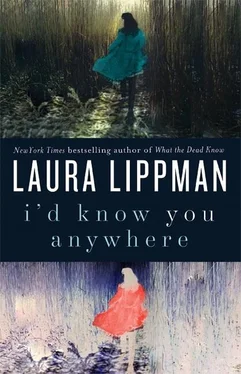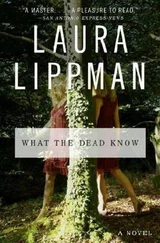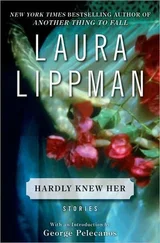Walter, it turned out, was not a particularly fast reader, and although they stayed in Fredericksburg for several days—he had found work with a private moving company, whose owner didn’t mind if Walter’s “little sister” tagged along—he managed to read only the first third of the book in the hours he had available.
But when they moved on at week’s end, Walter was dismayed to find that the next library didn’t have the book. And the library in the next town over had it on the noncirculating shelf, which required library patrons to sign for the book at the front desk, because it was a best seller. He made Elizabeth ask for it.
Say it’s for your mother, Walter said, and she did, only to find herself almost choking with tears. Her mother would never read such a book. Her mother would laugh at such a book.
The librarian didn’t seem to notice how emotional Elizabeth was. She gave her the book, saying only: “We’ve got a waiting list for the circulating copies. More than fifty names.”
Walter stole that copy of the book, an action he later justified at length to Elizabeth. “Taxpayers pay for those books,” he said. “And I’m a taxpayer, and I hardly ever use the library, so why shouldn’t I take just this one book?”
“But you’re not paying taxes now,” Elizabeth said. “Everyone you do jobs for pays you in cash. And you never paid tax in Virginia.”
“Sales tax,” Walter said. “Gasoline tax. I pay my share, and I’m not getting any services back. I’m not like that lady who drives her Cadillac to pick up her food stamps.”
“That’s a myth,” said Elizabeth, who remembered her father discussing the matter heatedly at the dinner table, just last year. Had it really been only a year ago? Now 1984 seemed impossibly distant. Her parents had been Mondale supporters, of course, and Elizabeth had gone to a rally in hopes of catching a glimpse of Geraldine Ferraro. Later, at school, some of the cooler boys had ridiculed her, and she had backpedaled, saying she didn’t like the Democrats, that her parents were for Mondale, but she wasn’t. She felt guilty for that now, and for all the dozens of small betrayals against them, the endless denial of their existence. True, her mom didn’t dress like the other moms and she wore her hair too long, loose, and unstyled. She hadn’t understood when Elizabeth wanted a bubble skirt. She never understood why Elizabeth wanted anything. She said she did; she was a psychiatrist, after all. But Elizabeth could see that her mother was puzzled by her, that she didn’t understand why, in a family of cheerfully loud, opinionated nonconformists, Elizabeth was determined to be like everyone else, never standing out from the crowd.
She had thought it was safer to be that way.
Walter read aloud from the stolen book to Elizabeth at night. He appeared to think it was wonderful, wise, and profound, and some of it was interesting to Elizabeth. The book counseled women to return to a more “natural” relationship with men, to celebrate their “inherent softness” while accepting that men were rough, a little wild. Meanwhile, women should realize that the best men were those who would care for them—not financially, but emotionally. They should not judge men by external things, such as clothes and looks, but learn to find men who were kind and supportive.
“This is the problem,” Walter said. “I do these very exact things and it doesn’t help at all. Not at all.”
Elizabeth was thinking about what it meant to be “natural.” Wouldn’t that mean not shaving your legs, not blow-drying your hair? Her mother might wear her hair long and loose, but she still shaved her legs. Elizabeth had not been able to shave her legs since the day that Walter took her, and they were now covered with soft fuzz. She wouldn’t want anyone to see it, but she liked the feel of it. At night, alone in her bed or sleeping bag, she stroked her legs, felt under her arms. Perhaps she was transforming into something new and formidable, an animal who could fight Walter or run away from him, swift and fleet.
Only she could never get away. Never.
Walter began to prefer his book to the stories that Elizabeth told and sometimes asked her to read from it as he drove. His favorite chapter was about a cold, driven businesswoman who thought she wanted someone exactly like herself.
“‘Maureen, twenty-nine, appears to have it all,’” Elizabeth read. “‘A willowy brunette, she works for a large department-store chain in Texas, part of the team that oversees its expansion plans. By day, she wears tailored suits, her sleek brown hair pulled back in a chignon—’”
“What is that?” Walter asked. “A shin-yon?”
“Like a bun, but fancier,” Elizabeth said. She pushed back her own short curls, which could no longer be arranged into anything. “You spell it c-h-i-g-n-o-n .” She knew that later, when Walter reread this section—and he always reread the sections she had covered during the day—he might challenge her, ask her why she had given him the incorrect word.
“Okay. Go on.”
She had lost her place in the text, needed a moment to locate it. “‘But at night, she lets it fall loose to her shoulders, as she prowls the clubs and nightspots of Dallas, looking for a man. She thinks she knows exactly what she wants—a professional, at her level or above—and she can tick her “no-nos” off on her fingers. “No mama’s boys, still living at home.”’”
“Living at home doesn’t make you a mama’s boy,” Walter put in.
“‘“No mama’s boys, still living at home. No fatties. Bald is okay, if he’s really cute and fit. In short—no losers.” Yet Maureen, for all her calculation and precise ideas about what she wants, never seems to find the right man. Oh, she finds professional men with good salaries and chiseled physiques, but they always disappoint her because Maureen has broken faith with her own femininity. She is trying to be a huntress. She has violated the natural order of things and will never find the right man until she learns to sit back, relax, and wait for him to find her.’”
Elizabeth pondered this. Her hero, Madonna, wore a belt that said BOY TOY, but it was clear that she was the one who toyed with the boys, who used them and moved on. Elizabeth had seen the movie Desperately Seeking Susan four times since it appeared last winter and yet never felt thoroughly satisfied by the ending. There was Rosanna Arquette, cute enough—cute enough that her rock star boyfriend had once even written a song about her—but it seemed strange that she was paired up with the really handsome guy, while Madonna was with the less desirable one, the one with the spiky hair. And, at the very beginning of the movie, Madonna had been in bed with someone else, so it wasn’t true-true love for her and the spiky hair guy, no matter how passionately they kissed. At the movie’s end, they seemed more companionable than lovestruck, chomping popcorn and laughing. Just last month, Madonna had gotten married to Sean Penn as helicopters circled. She was thinner now, not that she had ever been plump, her hair short and sleek. Elizabeth remembered reading about the couple’s decision to wed, how she had proposed to him because she knew it was what he wanted. She wondered what it would be like to know that a man wanted to marry you, to have the confidence to ask first. The author of this book clearly would not approve of Madonna.
“I wonder,” Walter said, “if Maureen ever found anyone?”
Elizabeth looked up, startled. “I don’t think she’s a real person.”
“Of course she is. It’s nonfiction. Says so right on the spine.” He pointed to the library label. Elizabeth wondered if they should scrape that off, if they would get in trouble if someone glimpsed it, so obviously far from home. But maybe if someone reported them for the stolen library book, the police would finally find her.
Читать дальше












